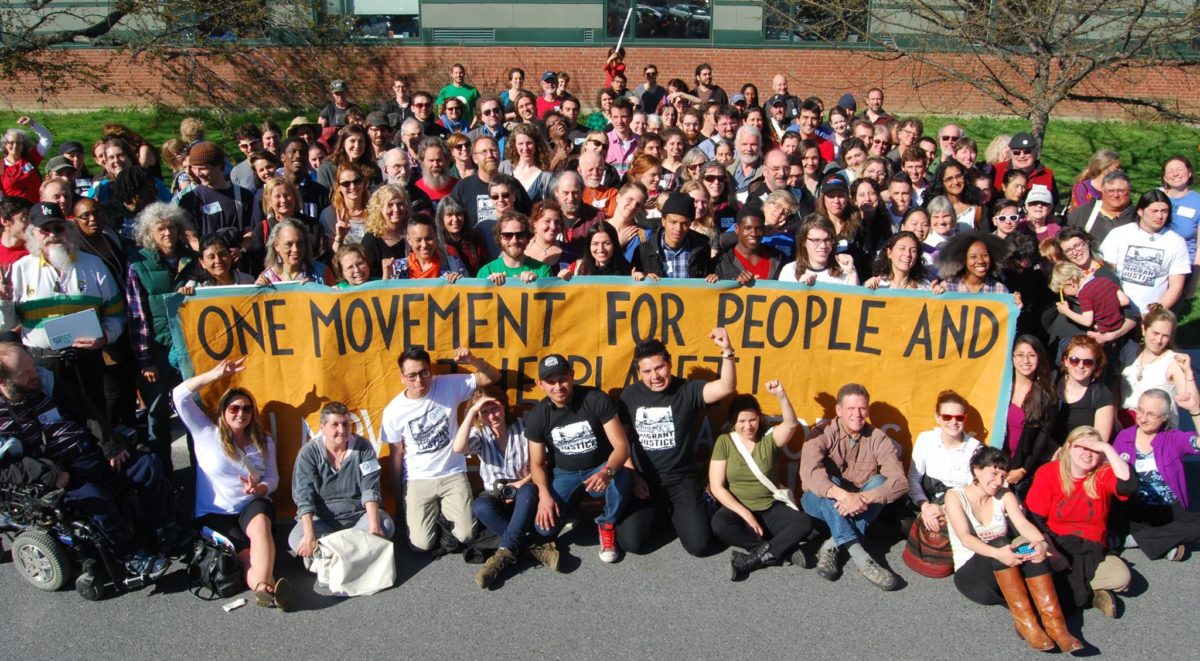Vermont Human Rights Council Calls for a Budget that Advances Equity and Dignity

Today, organizations affiliated with the Vermont Human Rights Council [1], a coalition of disability rights, climate justice, and workers’ rights organizations, released the following statement in response to Governor Shumlin’s budget address:
“The purpose of our state budget is to address the fundamental needs of all residents, and to advance dignity and equity. These are common sense goals that reflect the shared values of the people of Vermont. They are also stated in Vermont law (32 V.S.A. § 306a).
Yet today we witnessed once again the failure of state government to fulfill this basic obligation. Proposed budget cuts range from libraries to heating assistance, and from wage cuts for state workers to cuts to the Reach Up program, as well as continuing many of the additional cuts made to this year’s budget ($30 million in July and $12 million this month). Gutting public services and programs will harm many people in our state, at the same time as our tax system continues to privilege the wealthy and increases tax breaks for larger businesses.
Even though Vermont’s economy is now one of the fastest growing in New England, most people are not benefiting from this. On the contrary, the gap between the rich and the rest of us is widening. Median household income dropped to its lowest level in 10 years, poverty and homelessness are on this rise, and 1 in 6 Vermonters are forced to rely on food stamps to feed their families.
The Human Rights Council calls on our elected representatives to recognize that growing inequity in our state is a product of failed policies, and as such is up to legislators to change.
Here are just two examples: Vermont tax policy disadvantages low- and middle income people, who pay a greater share of their income in taxes than the wealthy. This unjust burden on the majority of residents has grown over the past few years: middle income people now pay almost 3% more of their income in taxes than the rich, compared to around 2% in 2007. The proposed elimination of the income tax deduction for state income taxes, while a step in the right direction, will not change this significantly. Growing inequity in the tax system is mirrored by inequity in healthcare financing, as a RAND study released this week reminded us: low- and middle-income residents pay a much greater share of their income for healthcare costs.
Our budget and revenue policy can change this, by developing spending initiatives that meet people’s needs and raise revenue equitably. Similarly, equitable public healthcare financing can offer huge financial relief to low- and middle income families. Yet the piecemeal health reform measures announced today fail to address the underlying problem of inequitable healthcare costs. As much as we welcome the long-overdue increase in Medicaid provider payments, along with cost relief for people on Vermont Health Connect – who were kicked off of public healthcare programs when these were eliminated by the Affordable Care Act – we have learned over the years that no single band-aid can cure the systemic flaws of a healthcare system whose goal is not to meet health needs but to generate revenue for a myriad of interests.
As a key budget and revenue issue, healthcare financing appears to have fallen prey to the administration’s refusal to make the wealthy and big businesses pay their fair share in taxes. Instead of offering relief to the smallest businesses and asking big businesses to pay more, based on their ability, the governor now proposes to fund his band-aid measures with a small flat payroll tax – the same type of tax that led him to drop financing reform in the first instance. Due to its regressive nature this tax continues to shield bigger corporations and the wealthy from more equitable taxation.
“Vermont needs a budget and a healthcare financing plan that start with people’s needs and raise money equitably to meet those needs,” said James Haslam, director of the Vermont Workers’ Center, “yet every year politicians do just the opposite: cutting the budget, giving tax breaks to large businesses, and defending private healthcare financing that hurts low-income people the most. Why do they not follow Vermont law, which requires us to advance dignity and equity in our state and to provide healthcare as a public good?”
Karen Topper, of Green Mountain Self-Advocates, said: “A budget is a document of values.We need our Vermont state budget to ensure that every person counts and is supported to live with dignity, respect and independence.”
Workers’ rights are also under attack in this budget proposal: the governor seeks to outlaw educators’ right to strike, cut wages and benefits of state workers, and lower the wage rate requirements for businesses that receive tax incentives.
Members of the Human Rights Council emphasize that budgeting must be a participatory, transparent and accountable process that involves the public in a meaningful way and avoids pitting different needs and rights against another. Will Bennington of Rising Tide Vermont said: “The Vermont Human Rights Council works collaboratively because we know that there is no climate justice without migrant justice, no workers rights without disability rights.”
The Human Rights Council calls on our elected representatives to change the budget and revenue process by instituting comprehensive and participatory needs assessments and an accountability framework that evaluates public policy decisions using accurate measures of unmet human need.
This year, as in previous years, we request that our representatives recognize that the current goals and processes used in developing the state budget are inadequate. The outcome of the current way of doing things is failing the people of Vermont.”
###
NOTES FOR EDITORS
1] The organizations signed onto this statement so far include Green Mountain Self-Advocates, Rising Tide Vermont, and the Vermont Workers’ Center. More sign-ons will be added here over the next 24hrs.
